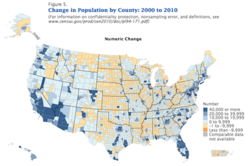Increased/Decreased Populations
 The population of a country increased by 2% per year from 2000 to 2003. If the population was 2,000,000 on December 31, 2003, what would be the population on January 1, 2000 (to the nearest thousand)?
The population of a country increased by 2% per year from 2000 to 2003. If the population was 2,000,000 on December 31, 2003, what would be the population on January 1, 2000 (to the nearest thousand)?
Image credit: US Census 2010
This section requires Javascript.
You are seeing this because something didn't load right. We suggest you, (a) try
refreshing the page, (b) enabling javascript if it is disabled on your browser and,
finally, (c)
loading the
non-javascript version of this page
. We're sorry about the hassle.
3 solutions
Use the standard compound interest forumla;
2 , 0 0 0 , 0 0 0 × 0 . 9 8 3 ≈ 1 , 8 4 8 , 0 0 0
(0.98 for the 2% decrease going backwards each year and the power of three as we are going back 3 years)
Not quite. You misused the formula.
Note that 0 . 9 8 = 1 . 0 2 1 . A 2% increase going forward is not equal to a 2% decrease going backwards.
Note that 2 , 0 0 0 , 0 0 0 × 0 . 9 8 3 = 1 , 8 8 2 , 3 8 4 ≈ 1 , 8 8 0 , 0 0 0 .
Log in to reply
Ah, thank you for pointing this out, Calvin! My bad - it's been a long day ;)
let x be the population of the country 2002 then by increase of 2% we have x + 2% x = 2000000 by solving we get 1960784 similarly repeating the process to 2000 on the fixed rate of 2 % we get 1846000
I got 1847691, and 1848000 was not an answer. 1.02^4 = 1.08243216 2000000/1.08243216=1847691
Log in to reply
Thanks, I have updated the answer choice to 1848000.
Let:
- x be the initial population
- y be the final population
- z be the number of years passed since January 1st 2000
We know 1.02 is the rate of change (obtained from the 2% growth) so from here we create a standard rate of change expression.
Plugging in the values we know. 2,000,000 as y and 4 as z
Whilst rounding to nearest whole number:
2000000/1.08243216= 1847691
Therefore:
x =1847691
x =1848000 (to the nearest thousand)